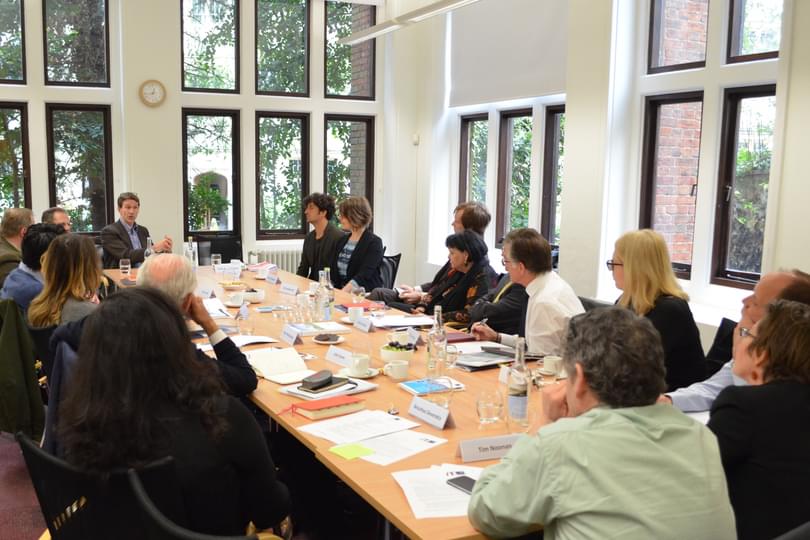
Representatives of global trade unions met with Oxford academics on 20 April for a day of discussions convened by the Oxford Martin School on the future of employment and the impact of new technology on workers.
The meetings brought together senior representatives from the International Trade Union Confederation (ITUC), the Trade Unions Advisory Committee (TUAC), UNI Global Union and the International Transport Workers’ Federation with academics from a wide range of fields, including economics, renewable energy, sociology, ageing and population change, modern British history, internet studies, work and organising in society, and politics and public policy.
Opening the discussion, the School’s Director, Achim Steiner, said: “I know that the trade union movement is constantly trying to articulate the vision that it is not against progress, not against new technologies, but that it is very keen on a ‘just transition’. We wanted to organise a day to articulate what from a worker’s point of view can be done, and there is much work taking place in Oxford that connects with this and with the real life choices that people face.”
The meetings were an opportunity for the unions to connect with the latest thinking on a range of issues affecting their members, and for Oxford academics to voice their views on key challenges facing the global workforce and trade unions. Among the areas discussed were workers’ rights relating to online recruitment platforms and the ‘gig economy’, the pitfalls of finding work online for workers in developing countries where governance may be lacking, the impact of technology on workers and clients in the care sector, and the need for political parties to develop new narratives around the future of work.
A working lunch for the delegates also took place with Professor Erik Brynjolfsson, who later gave a public lecture on ‘The Second Wave of the Second Machine Age’.
Sharan Burrow, General Secretary of the ITUC, said: “We need to bring labour back to the table: when you leave labour and working people out of the equation you will get opposition. What has driven Brexit and the election of Donald Trump is a lack of trust, and what we need is dialogue.
“We have a global workforce that is in deep trouble. Sixty per cent of people are in formal work, but half of that is insecure, low paid, often unsafe work with little or no social protection. Even formal environments can be very precarious for workers. Women and migrant workers largely make up those doing informal work, and then you have up to 45 million people in modern slavery.
“The interaction between humans and robots is exciting, and there is incredible technology coming through, but at the same time it’s frightening as it will hollow out middle skilled work, in our view.”
Eric Beinhocker, Executive Director of the Institute for New Economic Thinking at the Oxford Martin School, told the delegates that workers needed to be put back at the centre of a country’s economic narrative, and said unions needed to look at how they could cater to the growing sector of society who were self-employed and had no health benefits or pensions.
Dr Malcolm McCulloch, Co-Director of the Oxford Martin Programme on Integrating Renewable Energy, told the meeting that moving to renewables would present a $30 trillion change to the value of the energy sector, and a $10 trillion one to the transport sector. To manage the impact these changes would have on workers, unions needed to move from an adversarial role to a collaborative, networking one, he said.
Taking part in the meetings were:
- Sharan Burrow, General Secretary, International Trade Union Conference (ITUC)
- John Evans, General Secretary, Trade Unions Advisory Committee (TUAC)
- Philip Jennings, General Secretary, UNI Global Union
- Anna Byhovskaya, Policy Advisor, TUAC
- Victor Figueroa, Strategic Researcher, International Transport Workers’ Federation
- Tim Noonan, Director, Campaigns and Communications, ITUC
- Alison Tate, Director, Economic and Social Policy, ITUC
- Dr Greetje Corporaal, Researcher, Oxford Internet Institute
- Professor Pepper Culpepper, Professor of Politics and Public Policy, Blavatnik School of Government
- Professor Mark Graham, Professor of Internet Geography, Oxford Internet Institute
- Professor Sarah Harper, Professor of Gerontology
- Dr Vili Lehdonvirta, Senior Research Fellow, Oxford Internet Institute
- Dr Gina Neff, Associate Profesor of Sociology
- Professor Selina Todd, Professor of Modern History
- Eric Beinhocker, Executive Director, Institute for New Economic Thinking at the Oxford Martin School
- Dr Malcolm McCulloch, Co-Director, Oxford Martin Programme on Integrating Renewable Energy
- Dr Craig Holmes, Senior Research Fellow, Institute for New Economic Thinking at the Oxford Martin School
- Dr Michael Osborne, Co-Director, Oxford Martin Programme on Technology and Employment
- Professor Michael Keane, Nuffield Professor of Economics